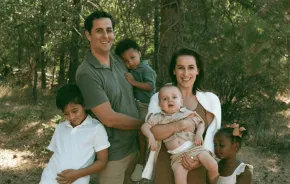On Aug. 11, ParentMap hosted a free webinar featuring Matthew Kronman, M.D., a pediatric infectious disease expert with Seattle Children’s Hospital. Dr. Kronman shared fascinating insights about COVID-19 and how this disease, caused by the novel coronavirus, impacts children. Parents had the chance to participate and send in their questions for Dr. Kronman. We're highlighting here some of the most interesting answers he gave — about asthma, playgrounds, kids with runny noses and more. You can also watch the full webinar and discussion online.
How many children in the U.S. have been infected with COVID-19 and how are they impacted?
The CDC looked at laboratory-confirmed cases from January until the end of May. The youngest age group, zero to nine, accounted for just 1.5 percent of all of the cases that had occurred in the United States. And another 3.7 percent in the age group of 10 to 19. So adding those together, it's a little more than 5 percent of all cases, but children make up about 22 or so percent of the United States. So it appears that children get this infection less often than adults do.
Multisystem Inflammatory Syndrome in Children (MIS-C) is an emerging phenomenon that we're just learning about. Broadly what this entails is prolonged fever, five days or more, and multiple different body systems being significantly impacted. It includes breathing difficulties. Cardiac problems are very common. Vomiting and diarrhea is quite common. Some children have a rash, bleeding disorders and other issues as well. And so in addition to those symptoms, they also have laboratory abnormalities that are frequently seen in these children. We definitely are seeing these children in Washington.
Should children diagnosed with asthma take greater precautions to avoid COVID-19?
The CDC looked at children in 14 different states who are hospitalized for COVID-19 and found that 13 percent of them had asthma. Compare that to the fact that about 8 percent of Americans have asthma to begin with. So that's not dramatically different. And in one other small study from New York City, it did not appear that asthma itself was a risk factor for developing severe COVID-19. Obesity, on the other hand, was associated with developing severe COVID-19 in that study.
I think asthma probably does not make children especially likely to get it or to get severely sick from it, but certainly, if they already have an underlying lung disease [then families should be extra cautious]. And asthma is again a huge spectrum where some people might have very mild asthma and some people might have very severe asthma. So the answer probably does depend a little bit on the individual.
Are there long-term effects on children who have had COVID-19?
In terms of long-term effects, the MIS-C phenomenon we talked about, Multisystem Inflammatory Syndrome in Children, appears to be a later phenomenon after [children have] had the infection. The estimate is that it happens maybe around three weeks, a month after having had the infection and that [MIS-C] itself can make children incredibly sick and can impair their heart function, for example, and the effects of that phenomenon could certainly have long-term consequences. It doesn't happen often, so the rate has been small, fortunately, but that's one way in which this infection can have long-term consequences.
Beyond that, though, it really is likely to be like many other common-cold-type viruses in the sense that when one has a common cold, it doesn't cause long-term effects for you, generally, once you get over it. And so for most children, we wouldn't think that this would cause any long-term consequences with the one caveat being that MIS-C phenomenon.
What are your thoughts about swimming pools, playground equipment and even small group activities like basketball, sports, etc.?
For each of these, I might think about a couple of factors: How old are the kids participating? If it's going to be four-year-olds at a playground, or let's even say two-year-olds at a playground, sticking a lot of things in their mouths, that might be a little bit riskier. If it is going to be 12-year-olds playing two-on-two basketball with just two kids from one family and two kids from another family, and they can wear cloth face coverings the whole time? That's maybe less risky. Is it an outdoor area or an indoor area? Is it a place where you could give it a quick wipe down before you started? Or is it too big and too crazy of a playground to think about doing that? Obviously, that might be unfeasible a lot of the time.
Those are some of the factors that go into that, but I think, again, that decision will have to be individualized for the family. There are other layers of risk. Perhaps your kids are going stir crazy and they've got to get out and do something active, but you might also have a grandma who is living with you and who has severe lung disease and if she got it, she could get really sick. So, that might limit your appetite for letting them go out. I think it just depends on the situation of the given family, unfortunately.
There are lots of questions regarding balancing children's mental, social and emotional health, but how do you balance these decisions with risk?
I think what we can do as parents is to try to control the variables that we can control, and we have to draw on our creativity to find those activities that will allow our children to play with their friends, to see their friends, to develop those healthy relationships. And so maybe it's being in a bubble with your family and one other family with kids of similar ages and having a lot of activities with them. Maybe it's more Zoom time for your children, with their friends, as much as we would want to avoid more screen time for our kids.
So, I think trying to pick activities that involve fewer people, more outdoor time, more hand-washing, more masking. Those are things that we can control, which maybe just gives us the illusion of control, but that would decrease the risk that our children would end up getting exposed and getting this infection and bringing it home. So, I do think there are things we can do to try and give our children those opportunities while minimizing risk as much as we can.
Do we need to get young kids tested for COVID-19 every time they have a runny nose? Or how long do we wait?
On the side of testing more, the more we test, the more we're able to find it in the community, have people quarantine, do contact tracing, and try and stop transmission in the community, as well as really know what's going on in the community. Of course, testing your toddler with a Q-tip up the nose every two days is not a pleasant experience for you or them. I think, the more we're able to test discrete illness episodes, the better. So if your daughter has a cold today and still has a runny nose tomorrow, and still the next day, I wouldn't test three days in a row but I might test once. And then, if they go a week and they're fine and they've returned to themselves, but then they develop a new cold, yeah, we probably should retest them at that point.
One way to think about it is as a public service benefit; to try and not only protect the people in the family and not spread it to others in the family, but also to identify where we are with this infection locally and prevent from spreading it to people outside the family. So, it may end up feeling like a lot of testing, and I know general pediatricians that I've been talking within our Seattle Children's Care Network and community are struggling with this, knowing that respiratory viral season is coming. It's summer now, but come October and beyond, we'll be seeing more of these other respiratory viruses circulating, and we'll certainly see a lot of children who have frequent runny noses. The average is about one cold a month in the school-aged kids.
The influenza season doesn't usually start until late December around here in Washington. Of course, this year probably won't be typical in any way and so that may be far off, but that's when it usually starts, and flu vaccine should be becoming available pretty soon. Getting an annual flu shot is the other way that we can try and protect our kids and prevent them from having those infections throughout the fall and through the winter.











